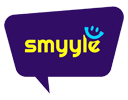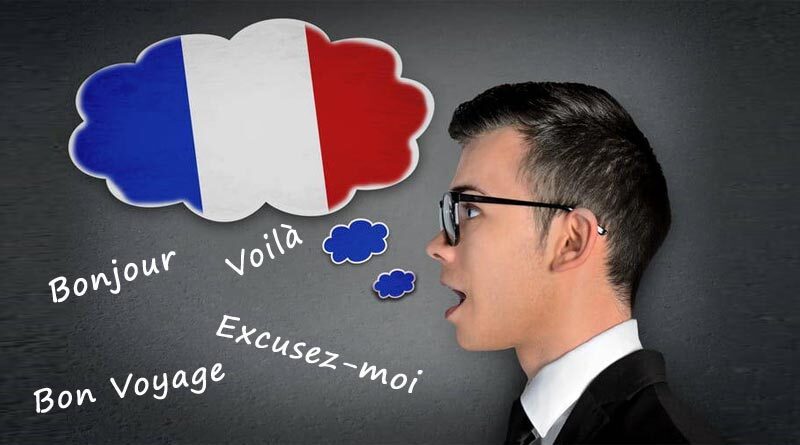Most commonly used French words and phrases you must know
In a world of increasing global connections, learning keywords and phrases in different languages is invaluable. French, known for its elegance and widespread usage, is a great language to explore. In this blog, we’ll uncover essential French words and phrases for social situations, from greetings to ordering at a restaurant. These practical expressions not only enhance your language skills but also offer insights into French culture. With globalization, French has become common in most countries, appearing in restaurants, Hollywood movies, and web series. Whether you’re interested in understanding menus or planning a future trip to France, this list of commonly used French words and phrases is a must-read. Join us on this journey to expand your linguistic horizons and embrace the beauty of the French language!
Top 10 most common French words
Bonjour (Hello)
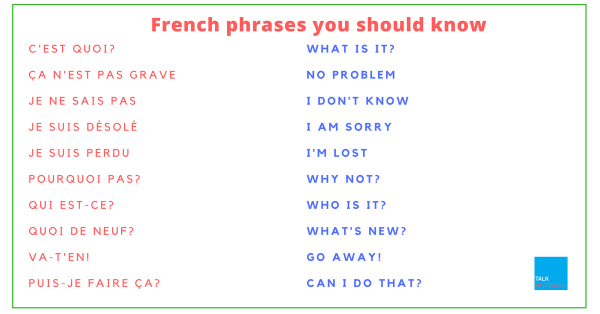
Bonjour is a combination of the adjective “bon” meaning “good” and the noun “jour” meaning “day.” The term “Bonjour” is used as a standard greeting in the French language, similar to “hello” in English. In France, the use of “Bonjour” is considered essential in social interactions and is a sign of politeness. It is customary to greet others with “Bonjour” when entering a shop, restaurant, or any public place. French culture places importance on greetings as a way of showing respect and acknowledging others. The word “Bonjour” reflects the emphasis on a positive and pleasant exchange during the day.
Merci (Thank you)
The word “Merci” is derived from the Latin phrase “merces tibi” which means “I give you thanks.” It is a simple and widely used expression of gratitude in the French language. “Merci” is pronounced as “mer-see” with a nasalized “e” sound. In French culture, saying “Merci” is considered an important social courtesy. It is customary to express gratitude by saying “Merci” when someone does something kind or helpful for you. It reflects the value placed on acknowledging and appreciating the actions of others. In addition to “Merci,” you may also hear variations like “Merci beaucoup” (Thank you very much) or “Merci bien” (Thank you kindly) to emphasize your appreciation.
Oui (Yes)
The word “Oui” is the French equivalent of “Yes” in English. It is a simple and commonly used word in the French language, pronounced as “wee.” “Oui” is one of the first words that French-speaking children learn to say. It is a fundamental part of everyday conversations and is used to affirm or confirm something positively. In French culture, there is a certain charm associated with saying “Oui” as it adds a touch of elegance to the language. Whether it’s agreeing with someone, giving consent, or simply acknowledging a statement, “Oui” is a versatile word that plays a significant role in French communication.
Non (No)
The word “Non” is the French equivalent of “No” in English. It is a straightforward and frequently used word in the French language, pronounced as “nohn.” In French culture, the use of “Non” can sometimes be seen as more polite and less direct compared to other languages. It is common to soften the negative response by adding phrases like “Je suis désolé(e)” (I’m sorry) or “Malheureusement” (Unfortunately) before saying “Non.” This reflects the emphasis on maintaining politeness and respect in French interactions. Additionally, “Non” can also be used to express disagreement or to indicate a negative response to a question or request.
Excusez-moi (Excuse me)
“Excusez-moi” is a polite and commonly used phrase in French, which translates to “Excuse me” in English. It is pronounced as “ehk-skyoo-zeh-mwah.” In French culture, politeness and respect are highly valued, and “Excusez-moi” is an important phrase used to show consideration for others. It is used in various situations, such as when trying to get someone’s attention, asking for forgiveness, or politely interrupting a conversation. French people often use this phrase to navigate social interactions gracefully and maintain a polite demeanor. Remembering to say “Excusez-moi” when appropriate will help you navigate through different situations with courtesy and respect in French-speaking environments.
S’il vous plaît (Please)
“S’il vous plaît” is the French equivalent of “Please” in English. It is a polite phrase used to make requests or express politeness. The pronunciation is “see voo play.” In French culture, using “S’il vous plaît” is essential for demonstrating good manners and showing respect towards others. It is considered impolite to make demands without using this phrase. Whether you’re ordering food at a restaurant, asking for directions, or requesting assistance, incorporating “S’il vous plaît” in your sentences will greatly contribute to positive interactions. Remembering to say “S’il vous plaît” not only shows your appreciation for the person you’re addressing but also reflects your understanding and adherence to French etiquette.
Au revoir (Goodbye)
“Au revoir” is a common French phrase used to say “Goodbye.” It is pronounced as “oh ruh-vwahr.” The literal translation of “Au revoir” is “Until we see each other again.” It reflects the French culture’s emphasis on maintaining connections and leaving on a positive note. In French-speaking countries, it is customary to use “Au revoir” when parting ways with someone, whether it’s a casual encounter or a more formal setting. Remembering to say “Au revoir” shows your politeness and consideration for others, leaving a lasting impression of goodwill and respect. So, the next time you say goodbye to someone in French, don’t forget to bid them “Au revoir.”
Pardon (Sorry)
“Pardon” is the French word for “Sorry” or “Excuse me.” It is used to apologize for a mistake, seek forgiveness, or get someone’s attention. The pronunciation is “pahr-dohn.” In French culture, using “Pardon” is a way to show politeness and acknowledge one’s own actions or words that may have caused inconvenience or offense. It reflects a sense of personal responsibility and consideration for others. Whether you accidentally bump into someone on the street or need to interrupt a conversation, saying “Pardon” demonstrates your respect and willingness to rectify any unintentional missteps. It’s an essential phrase to have in your French language repertoire to navigate social situations with grace and courtesy.
Comment ça va? (How are you?)

“Comment ça va?” is a common French phrase used to ask “How are you?” It is pronounced as “koh-mahn sah vah.” “Comment ça va?” is a typical greeting in French-speaking countries and reflects the French emphasis on personal connections and well-being. When asking this question, the expectation is for a genuine response, rather than a mere formality. French culture values meaningful interactions and cares about the well-being of others. So, when someone asks you “Comment ça va?” in French, feel free to share how you’re truly feeling and engage in a sincere conversation about your day or overall state of being. It’s a wonderful way to connect with others on a deeper level.
Je t’aime (I love you)
“Je t’aime” is a powerful and widely recognized French phrase that means “I love you.” It is pronounced as “zhuh tem.” “Je t’aime” is often considered one of the most beautiful and romantic expressions in the French language. It carries deep emotional significance and is used to express profound love and affection towards someone. Whether spoken between romantic partners, family members, or close friends, “Je t’aime” conveys a heartfelt sentiment. In French culture, expressing love and affection is highly valued, and this phrase holds a special place in the realm of emotions. So, the next time you want to express your love in French, remember to say “Je t’aime” to convey those powerful feelings.
Important French Verbs
- Être – to be
- Avoir – to have
- Aller – to go
- Faire – to do/make
- Dire – to say/tell
- Pouvoir – to be able to/can
- Voir – to see
- Savoir – to know (facts/information)
- Devoir – to have to/must
- Vouloir – to want
Dining Out: Essential French words for Ordering Food and Drinks

When dining out in France, it’s useful to know some essential French words for ordering food and drinks. Here are some key words to help you navigate the menu and communicate your preferences:
- Menu – Menu
- Entrée – Appetizer
- Plat principal – Main course
- Dessert – Dessert
- Boisson – Drink
- Vin – Wine
- Bière – Beer
- Eau – Water
- Café – Coffee
- Thé – Tea
Directions and Transportation: Words for Getting Around

- Où est… ? – Where is…?
- Comment aller à… ? – How do I get to…?
- À gauche – Left
- À droite – Right
- Tout droit – Straight ahead
- Prenez la première rue à gauche/droite – Take the first street on the left/right
- Le carrefour – Intersection
- La gare – Train station
- L’aéroport – Airport
- L’arrêt de bus – Bus stop
- Le métro – Subway
- Le taxi – Taxi
- Le train – Train
- Le billet – Ticket
- Le plan de la ville – City map
French Household Words
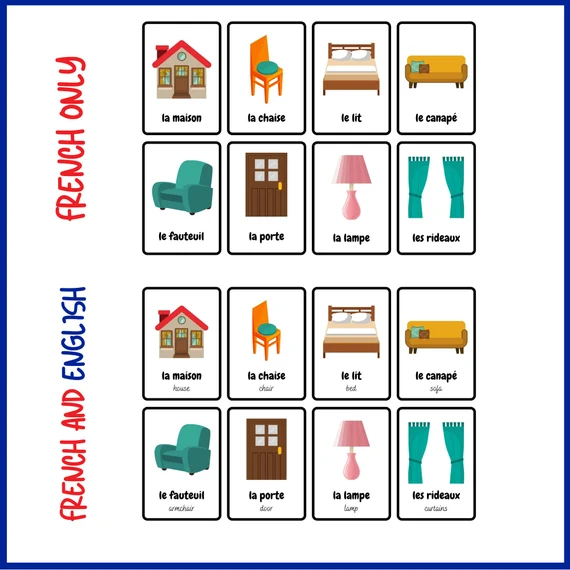
- La maison – House
- L’appartement – Apartment
- La chambre – Bedroom
- La cuisine – Kitchen
- La salle de bain – Bathroom
- Le salon – Living room
- La salle à manger – Dining room
- Le lit – Bed
- La table – Table
- La chaise – Chair
- Le canapé – Sofa
- La télévision – Television
- Le réfrigérateur – Refrigerator
- Le four – Oven
- La cuisinière – Stove
- L’évier – Sink
- Le lavabo – Washbasin
- La douche – Shower
- Le miroir – Mirror
- Le placard – Closet
French Words for School or Work
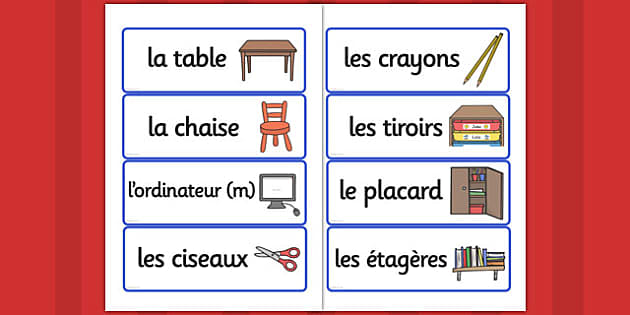
- L’école – School
- Le travail – Work
- L’étudiant(e) – Student
- L’enseignant(e) – Teacher
- Le bureau – Office
- Le collège – Middle school
- Le lycée – High school
- L’université – University
- Le cours – Class
- La leçon – Lesson
- Le devoir – Homework
- L’examen – Exam
- Le diplôme – Diploma
- La carrière – Career
- Le métier – Profession
- Le CV (Curriculum Vitae) – Resume
- L’entretien d’embauche – Job interview
- Le contrat – Contract
- La réunion – Meeting
- Le projet – Project
These words and phrases provide a solid foundation for effective communication in various social and practical situations. Whether you’re greeting someone, ordering food at a restaurant, asking for directions, or engaging in basic conversation, having a grasp of these common words and phrases will greatly enhance your language skills and cultural understanding. Like this post? Don’t forget to check out our other short stories in our Quick Read section
